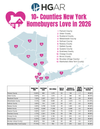PELHAM—With the COVID pandemic hopefully winding down, the Westchester County real estate markets are at a crossroads with some sectors booming and others struggling to adapt to changing consumer and tenant needs.
What better person to talk to about these turbulent times than Joseph Apicella, the longtime right-hand man to high-profile Westchester developer Louis Cappelli and now the managing director of Pelham-based MacQuesten Development, LLC, which specializes in affordable multifamily and mixed-use developments in cities such as Yonkers, New Rochelle, Mount Vernon, as well as in Brooklyn and the Bronx.
Apicella joined MacQuesten, which is headed by founder and CEO Rella Fogliano, in 2015. For almost 20 years previously Apicella, as executive vice president for Valhalla-based Cappelli Enterprises, played pivotal roles in the development of The Ritz-Carlton, Westchester Renaissance Square, a 1.4 million square-foot complex in Downtown White Plains that includes a 43-story tower, the tallest building in Westchester County; City Center White Plains, which includes the 212-unit Trump Tower high-rise and an 18-screen National Cinema Deluxe movie multiplex; Trump Plaza New Rochelle—that city’s tallest building; and the Trump Park Residences Yorktown. The combined value of those projects exceeds $2 billion.
Real Estate In-Depth: How has the COVID-19 pandemic affected your operations and has the emergence of the Delta variant given MacQuesten any pause on moving forward with any of its ventures at this point?
Apicella: The offices that you are sitting in now (in Pelham) have been open throughout the entire pandemic. We never missed a day of work here. Thank God none of us got sick. Now, we also have floor-to-ceiling glass in all our offices and we don’t have a heavy-duty group here. We have about 10 people here. But, the reason we remained open was because we were deemed an essential business because we build affordable housing for seniors, congregate care, etc., so we kept working. We never stopped.
While we are seeing, as others are seeing, material shortages and material delays, it has not slowed us down. We continue to move forward. As the market got tighter, and as housing became less available to the people who were the most vulnerable during the pandemic, we ramped things up. And there were more funds available on the government level—tax credit financing, grants, a New Home Lands acquisition loan program on the (Westchester) county level and the housing fund with the City of New York grew. There is more of a need as things get more difficult for the at-risk communities, particularly when you look at those that were hit the hardest by COVID. Look at those Census tracts in Bushwick, Brooklyn and East New York, the city did everything to incentivize us (developers, investors) than ever before. So, access to capital and to the capital markets increased for this type of housing during the pandemic. I can’t say the same, as I understand it, for market-rate or luxury housing.
 Real Estate In-Depth: Cushman & Wakefield in a recent report predicted a return to office during the first quarter of 2022. Do you agree and what are your thoughts on the health of the office market at least in the short term?
Real Estate In-Depth: Cushman & Wakefield in a recent report predicted a return to office during the first quarter of 2022. Do you agree and what are your thoughts on the health of the office market at least in the short term?
Apicella: I agree that for a host of reasons we are going to have a hybrid (office model). People will return, if not on a full-time basis, to a two-to-three-day-a-week office scenario. You still have to lease the space. You are not going to get it for free. “Well I am only using it two or three days a week,” the tenant might say. If I am your landlord, I don’t care, you pay your rent…
I think the office market is going to come back, but now with the advent of Zoom calls and video conferencing, you are going to have a lot less travel. So, people will come back and forth to work, but they won’t be leaving work three or four times a day.
Editor’s Note: When asked whether the new hybrid model will result in less leased space, Apicella said he did not think so because many companies believe collaboration is done best in person at the office. He added:
You really can’t collaborate if you are 100 miles away or only on a video conference. It is optimal to be together. Do you need to be there five-days-a-week, maybe not. But, when you get there, instead of going out to meetings in Manhattan, you are going to go on a video call. In terms of my business group, I want to see them together (in-person) because that’s our team, but we don’t need to be together with the salespeople necessarily. If they want to they can come to our office, but we don’t need to be together in their facility, we can video conference to make the business deal. I am not going to get in the car and go to Manhattan. You lose a day when you go to Manhattan… You can’t answer your e-mails, you can’t answer your phone calls. So, that’s what we do. We come to the office every day, but we Zoom everything else.
 Real Estate In-Depth: You and others in the commercial real estate brokerage and development sectors predicted severe consequences from the natural gas moratorium imposed by Con Edison in 2019. I think you would agree the development sector has adapted and has continued building new projects despite the moratorium still being in place. Can you tell us how the development sector has coped with the moratorium and how it is implementing measures to deal with climate change in their projects?
Real Estate In-Depth: You and others in the commercial real estate brokerage and development sectors predicted severe consequences from the natural gas moratorium imposed by Con Edison in 2019. I think you would agree the development sector has adapted and has continued building new projects despite the moratorium still being in place. Can you tell us how the development sector has coped with the moratorium and how it is implementing measures to deal with climate change in their projects?
Apicella: I took a strong position publicly during the public hearings on the natural gas moratorium involving Con Edison and so did many others, including elected officials. When we look at this intelligently, what I and a lot of other people who objected to the moratorium were most concerned about was the abrupt manner in which they were instituting it over a six-week to eight-week period. It didn’t give projects that were in the pipeline the opportunity to adapt to other scenarios, like possibly geothermal, co-generation or electrical power options. We didn’t have the time to do that so I think that was the thing that both myself and a lot of the other elected officials and other professionals in the industry, mechanical engineers and alike, were concerned with. And I thought they could have rolled it out a lot better.
However, the incentive package through NYSERDA and other government and state agencies I think were bountiful and they helped to cushion the blow for us. While I can only speak for MacQuesten, although I am on the Business Council’s Development Task Force, I can tell you that a lot of my colleagues, both from publicly-traded companies and private companies, we really are looking at the most efficient, economic and environmentally healthy options. I think it did force us to move more quickly to alternative fuels…
 Real Estate In-Depth: Joe, you were executive vice president at Cappelli Enterprises and played pivotal roles in the development of The Ritz-Carlton, Westchester Renaissance Square, City Center White Plains, Trump Tower, Trump Plaza New Rochelle and others and now with a host of projects at MacQuesten, where do you see the commercial and multifamily sectors going in the next five years and are there headwinds for the markets that could hamper their growth?
Real Estate In-Depth: Joe, you were executive vice president at Cappelli Enterprises and played pivotal roles in the development of The Ritz-Carlton, Westchester Renaissance Square, City Center White Plains, Trump Tower, Trump Plaza New Rochelle and others and now with a host of projects at MacQuesten, where do you see the commercial and multifamily sectors going in the next five years and are there headwinds for the markets that could hamper their growth?
Apicella: It’s interesting, when we look at Westchester and the lower Hudson Valley in general there are so many market studies that indicate that there is still growing demand for more (rental) apartments. I am of the belief that while there is still demand for more rental apartments, and there has been, due to COVID, an artificial increase in demand for housing in Westchester and the Hudson Valley because of an exodus from the city, I think that is going to wane a little bit over the next few years…
I think the demand that is going to happen in Westchester is for for-sale housing. All of the for-sale housing that was built prior to 2008, which was before the market crash, are occupied. There are one or two projects that are out there in Westchester County that I can think of—one is in Kingfield in Rye Brook that is selling like hot cakes. They are attached and semi-attached homes—a planned unit development. But, if I want to buy a condo and I want carefree living in Westchester, where do I go? I am coming out of a home—the average price of a home (in some sections of Westchester) is approximately $1 million. So, I am coming out of that house, I am not going to live in a band-box of an apartment of about 800 square feet. I want a nice condo with amenities like the St. Regis (Residences) in Rye or like what the Ritz-Carlton (in White Plains) provides…
The 2008 crash scared the crap out of people. It traumatized the development community. People forgot about that with all the other calamities we have had and that is why you see little if any non-branded for-sale projects in this area. You don’t see them. The only ones are branded, high-end product. But, I have news for you, it may not be my forte right now because I do mostly affordable projects and working families housing, I think this will be a tremendous market for market-rate, for-sale housing. Just look at the homes in my area (Rye Brook). They are on the market for a day or two and they are gone and that is artificially stimulated by the COVID scenario, but having said that people who live in New York City have discovered that they don’t want to pay $50,000 a year for private schools and then have to live in a congested downturn with the fear of the next pandemic. So, why would I want to live in this congested area. Instead I would rather live in a more bucolic environment in the suburbs, but I want to have my own home. There are many young people that want to start a family. They love Westchester. The school system is incredible, some of the highest-ranked schools in the nation are in Westchester… Where is your housing? Show me where they are building either condominiums or single-family homes in Westchester?
 Real Estate In-Depth: The firm you work for—MacQuesten Development LLC—has been very active with mixed-use multifamily and commercial projects in Mount Vernon, Yonkers, New Rochelle and the Bronx. Can you provide us with an update on the firm’s pipeline of projects?
Real Estate In-Depth: The firm you work for—MacQuesten Development LLC—has been very active with mixed-use multifamily and commercial projects in Mount Vernon, Yonkers, New Rochelle and the Bronx. Can you provide us with an update on the firm’s pipeline of projects?
Apicella: Right now, our focus has been on Westchester, The Bronx and Brooklyn. We just completed a $55-million project known as 679 Van Sinderen Ave. in Brooklyn in the East New York section and that is comprised of two buildings, 132 units, two superintendents’ units. It’s a colorful building and has a nice amenity package. We are leasing up now, we are about 95% to 100% leased. It is a (New York City) Housing Preservation and Development (HPD) project. We have purchased one of the lots and the other lot we purchased from the City of New York for $1, which is their incentive to firms such as ours, we are a Minority Women Business Enterprise, where we have an opportunity with some of these city-owned sites.
Editor’s Note: Apicella then provided great detail on a host of projects that were recently completed or are in MacQuesten Development’s pipeline. However, only a short description of the projects can be included due to space limitations. The firm completed work in mid-2020 on the much-heralded 22 Southwest in Mount Vernon, an 18-story high-rise that involved the cleanup of the brownfield site before construction on the LEED-certified building commenced. The 174-unit building, valued at approximately $80 million, is currently 95% leased and also features 4,157 square feet of retail space.
Among the projects in the works include 1510 Broadway in the Bushwick section of Brooklyn, which is scheduled to break ground in the next six months. The $40-million, eight-story, 107-unit development also will include approximately 9,723 square feet of retail space.
The company is moving forward with a major project at Cedar and Harrison streets in New Rochelle. The $150-million project would include a 28-story affordable housing project featuring 238 units, 6,700 square feet of ground floor retail and 50,000 square feet of office space that will be the future home of New Rochelle City Hall. Apicella said MacQuesten hopes to break ground on the project sometime in 2022. He said the project, along with its 22 Southwest development with their numerous amenities “blurs the line between affordability and luxury housing.”
Other projects include the St. Clair, a 10-story, 76-unit development in Yonkers that will offer 76 apartments at anywhere from 40% to 80% of Average Median Income that will be marketed as workforce housing. Retail space will be available at the ground floor. Apicella said that the company is seeking approvals of the development that will involve some brownfield cleanup, and hopes to break ground by March or April of next year. MacQuesten is also looking to redevelop a former nursery and construction materials yard at 136 Croton Ave. in Ossining and build a $30-million, 77-unit affordable senior housing project at the site.






 Real Estate In-Depth: Cushman & Wakefield in a recent report predicted a return to office during the first quarter of 2022. Do you agree and what are your thoughts on the health of the office market at least in the short term?
Real Estate In-Depth: Cushman & Wakefield in a recent report predicted a return to office during the first quarter of 2022. Do you agree and what are your thoughts on the health of the office market at least in the short term? Real Estate In-Depth: You and others in the commercial real estate brokerage and development sectors predicted severe consequences from the natural gas moratorium imposed by Con Edison in 2019. I think you would agree the development sector has adapted and has continued building new projects despite the moratorium still being in place. Can you tell us how the development sector has coped with the moratorium and how it is implementing measures to deal with climate change in their projects?
Real Estate In-Depth: You and others in the commercial real estate brokerage and development sectors predicted severe consequences from the natural gas moratorium imposed by Con Edison in 2019. I think you would agree the development sector has adapted and has continued building new projects despite the moratorium still being in place. Can you tell us how the development sector has coped with the moratorium and how it is implementing measures to deal with climate change in their projects? Real Estate In-Depth: Joe, you were executive vice president at Cappelli Enterprises and played pivotal roles in the development of The Ritz-Carlton, Westchester Renaissance Square, City Center White Plains, Trump Tower, Trump Plaza New Rochelle and others and now with a host of projects at MacQuesten, where do you see the commercial and multifamily sectors going in the next five years and are there headwinds for the markets that could hamper their growth?
Real Estate In-Depth: Joe, you were executive vice president at Cappelli Enterprises and played pivotal roles in the development of The Ritz-Carlton, Westchester Renaissance Square, City Center White Plains, Trump Tower, Trump Plaza New Rochelle and others and now with a host of projects at MacQuesten, where do you see the commercial and multifamily sectors going in the next five years and are there headwinds for the markets that could hamper their growth? Real Estate In-Depth: The firm you work for—MacQuesten Development LLC—has been very active with mixed-use multifamily and commercial projects in Mount Vernon, Yonkers, New Rochelle and the Bronx. Can you provide us with an update on the firm’s pipeline of projects?
Real Estate In-Depth: The firm you work for—MacQuesten Development LLC—has been very active with mixed-use multifamily and commercial projects in Mount Vernon, Yonkers, New Rochelle and the Bronx. Can you provide us with an update on the firm’s pipeline of projects?


